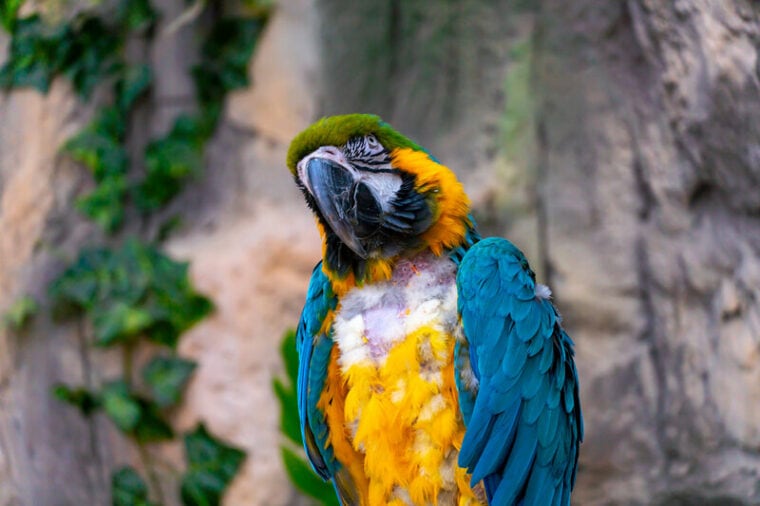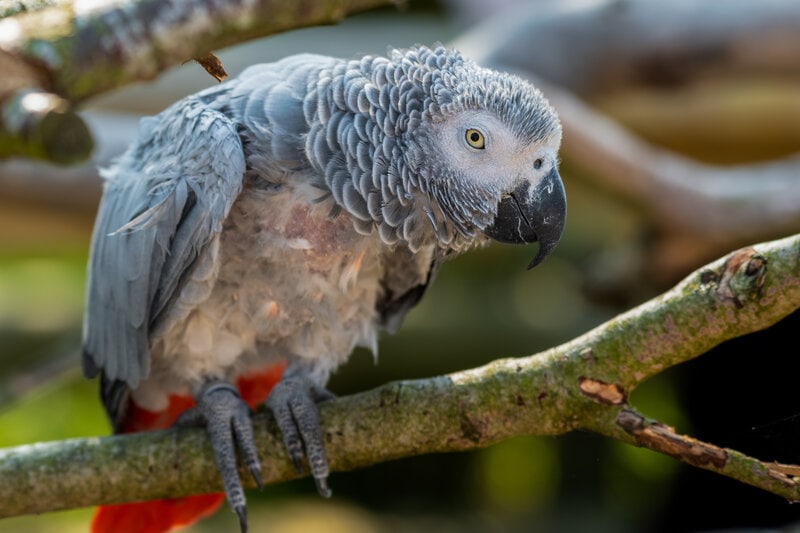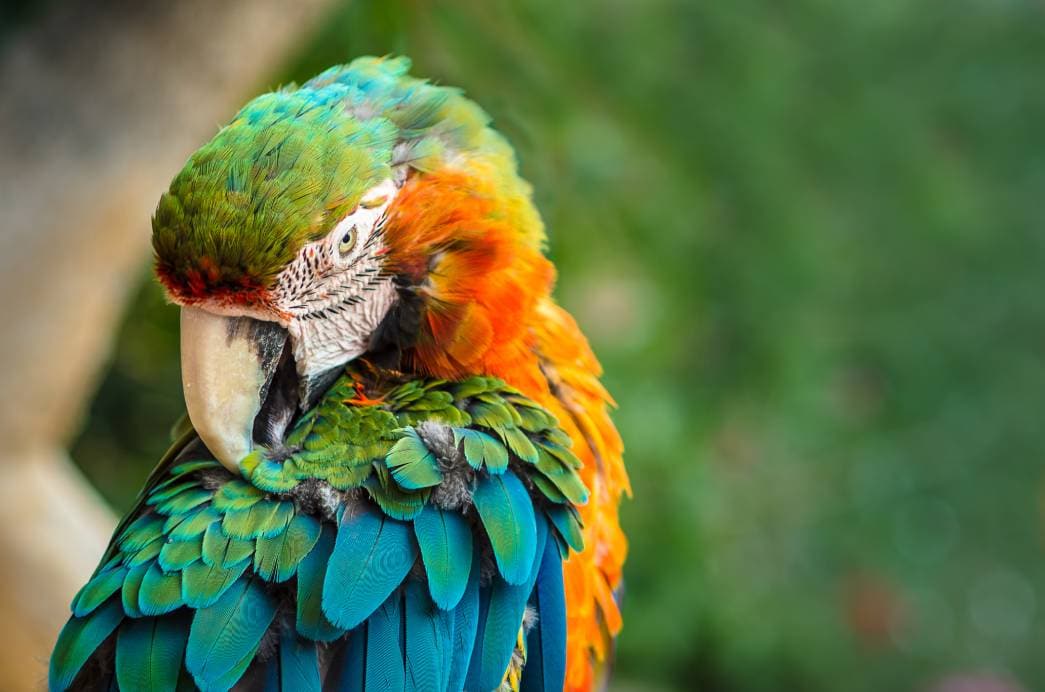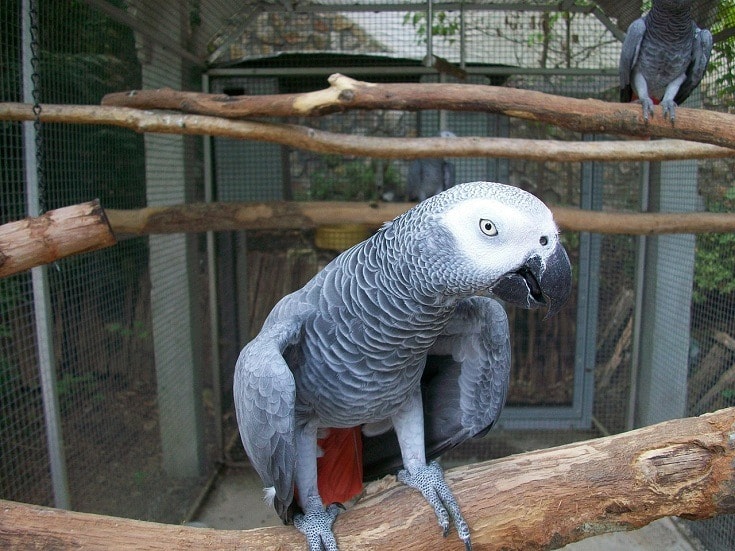
Click to Skip Ahead
Parrots are popular pets in America, but since they have such a long lifespan (30–80 years), most of us start out as inexperienced owners with plenty of questions. For the most part, parrots are easy to care for, and they won’t give you much trouble. They will mimic sounds, speak words, and even dance.
However, if they start plucking out their feathers, this is abnormal and could be a cause for concern. Owners should seek help to understand the cause and find a solution. If you notice your bird is pulling out its feathers and would like to know what you can do about it, keep reading while we list several possible explanations to help you find an answer, so you can get your bird back to normal as soon as possible.
 Types of Mutilation
Types of Mutilation
Feather Picking
Feather picking is when your parrot chews at the feathers, which can cause them to splinter and break. This picking can change the look of your bird as most of the feathers become short stubs.

Feather Plucking
Feather plucking is when your parrot plucks out its feathers, including the quill, exposing the skin below.
Self-Mutilation
In extreme cases, once the feathers are gone, the bird might start to pick at its skin, causing lacerations that can get infected, putting your pet’s health at risk.

Normal Feather Cycles & Upkeep
Molting
Many people might not realize that just like dogs and cats shed their fur twice a year, so must a parrot shed its feathers. The process of shedding old and worn-out feathers is called molting and will occur once or twice per year. Feathers wear out naturally, and replacing them can keep your bird healthy, warm, and able to fly. While your parrot is molting, you will likely see plenty of feathers on the cage floor. Molting puts a lot of stress on your bird, so they may seem more aggressive than usual, but you shouldn’t need to worry. The process will be over quickly and usually only takes a few weeks, though it can take a couple of months.
If your bird suffers a stressful event while molting, you will see the evidence in the feathers. Stress causes a line to form across the width of the feather, and if a new feather has several of these bands, we recommend surveying your bird’s habitat and taking your pet to the vet to see if you can figure out why it is experiencing so much anxiety.
What Can I Do About It?
Molting is a natural process that you do not need to interfere with as long as your bird seems to be healthy.

Preening
Parrots and most other birds need to preen their feathers continuously to keep them in perfect condition. Preening is when the bird uses its beak to clean and straighten each one of its feathers, and it’s easy to see why an inexperienced owner can mistake it for feather plucking. Birds meticulously align their feathers and can spend plenty of time each day working on it. Preening can look a lot like your bird is plucking their feathers, especially when it’s molting, and a lot of feathers end up on the ground. However, preening will not harm your pet and is necessary, even for pet birds that don’t fly.
What Can I Do About It?
Preening is necessary to keep your bird’s feathers in optimal condition. Unpreened feathers can make it more difficult to fly, which puts the bird in a vulnerable position.

The 4 Plucking Reasons for Concern
1. Improper Diet
A pathological reason of concern is an improper diet that leads to malnutrition, causing feather plucking. It usually occurs when the parrots eat a seed-only diet. Sunflower seeds and many others have too much fat and not enough vitamin A, which is essential for a successful molt. A vitamin A deficiency can cause thickening of the skin with excessive scaliness and flakiness of the feet. The lack of vitamins can make molting more difficult, increasing stress and grooming, which can wear down and destroy the feathers.
What Can I Do About It?
Switching from an all-seed diet to a balanced one containing fruits, vegetables, and a commercial pellet food will help provide all of the vitamins and minerals your pet requires to develop stronger feathers and make molting easier.

2. Parasites
Parasites are a serious concern for wild parrots, but they are fairly rare in pets where there is little exposure to the outside elements. However, mites and lice can find their way into your home on occasion and cause trouble for your pet. These parasites can make the skin itchy, causing your parrot to pull out its feathers.
What Can I Do About It?
If you suspect your parrot has parasites, we recommend taking it to the vet as soon as possible to get the medication your pet requires.
3. The Environment
The environment is another thing that can add too much stress to your pet, resulting in it plucking its feathers. Loud noises from the television, children, dogs, and many other sources can startle and scare your bird. Most parrots come from rainforests where they have bathing opportunities and regular rainfalls, so while they do not need any soap or shampoo, regular misting is important for their feathers and skin. Your bird also needs a natural cycle of day and night. If lights illuminate the cage, it can be difficult for your pet to get the rest it needs resulting in a high-stress environment that leads to feather plucking.
What Can I Do About It?
We recommend placing the cage in a quiet area of the home, away from children and pets if possible. Ensure you mist your bird regularly. Timers can also help you set up the proper day-night cycle so your bird can get plenty of sleep and will get used to a routine.

4. Boredom
As we try to mention as often as we can, your parrot requires plenty of playtime with family members. Not getting enough playtime can cause your bird to try several tactics to get your attention, including pulling your hair and squawking from the other room. If these tactics don’t get your attention, it can cause your pet to get anxious, which can lead it to start plucking out its feathers.
What Can I Do About It?
The best way to avoid boredom for your pet is to make sure you spend plenty of time with them. Provide a rotation of environmental enrichment and toys that provide physical stimulation. Engage your bird into training and learning new words and behaviors. Offering plenty of time outside the cage can also work wonders for keeping your pet happy and satisfied.
 Parrots and Plucking
Parrots and Plucking
As you can see, there are plenty of reasons why your parrot might be plucking its feathers, but none of them are hard to fix so your bird can get healthy again. The most common cause is a poor diet, but a close second is the environment. Keeping the cage in a quiet part of the home while at the same time ensuring your parrot has plenty of activities to keep the mind and body engaged can be great ways to keep your bird happy.
We hope you have enjoyed reading over this guide and found it helpful in answering your questions. If we have helped you feel better about your bird’s behavior, please share this guide to why parrots pluck their feathers on Facebook and Twitter.
Featured Image Credit: ProleR, Shutterstock

 Types of Mutilation
Types of Mutilation





